What Are Content Mills … and Why Should Freelancers Avoid Them?
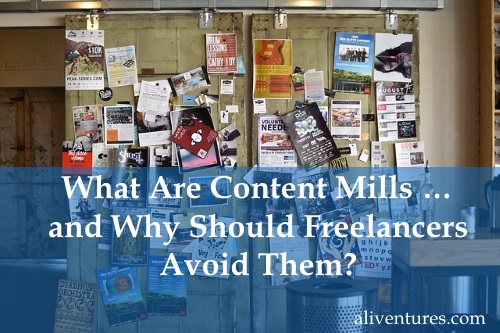 If you’ve been around freelance writing world, you’ve probably heard the phrase “content mills”.
So what the heck is a content mill?
It’s a large website that offers lots of low-paid writing gigs – either writing for the website itself or with third-party clients.
“Content mill” is a somewhat pejorative term, so you won’t hear sites proudly proclaiming “we’re a content mill – come and work with us!”
I don’t imagine any new freelancer starts out thinking that they’d love to write for peanuts … but sadly, many fall into that trap. They look for writing jobs online, and they come across a content mill; they sign up, with the promise of easy, regular writing work … and they end up making an incredibly low rate, like $5/hour.
Some big, well-known content mills are:
If you’ve been around freelance writing world, you’ve probably heard the phrase “content mills”.
So what the heck is a content mill?
It’s a large website that offers lots of low-paid writing gigs – either writing for the website itself or with third-party clients.
“Content mill” is a somewhat pejorative term, so you won’t hear sites proudly proclaiming “we’re a content mill – come and work with us!”
I don’t imagine any new freelancer starts out thinking that they’d love to write for peanuts … but sadly, many fall into that trap. They look for writing jobs online, and they come across a content mill; they sign up, with the promise of easy, regular writing work … and they end up making an incredibly low rate, like $5/hour.
Some big, well-known content mills are:
- Demand Studios / Demand Media [now out of business] – eHow was one of their websites
- Textbroker
- Upwork [formerly Elance and oDesk]
- Examiner
- Fiverr
 Those promises, though, don’t tend to pan out. You’ll hear the occasional story of a freelancer who makes OK-ish money through content mills … but you’ll hear far more from burnt-out writers who’ve been working long, boring hours for next to nothing.
Those promises, though, don’t tend to pan out. You’ll hear the occasional story of a freelancer who makes OK-ish money through content mills … but you’ll hear far more from burnt-out writers who’ve been working long, boring hours for next to nothing.
What Content Mill Jobs Look Like
If you join a content mill, you’ll likely see a huge range of jobs. Brilliant, right? Here are lots of people just waiting for a writer. Dig a tiny bit deeper, though, and the situation doesn’t look so good. Here’s a job taken from Upwork: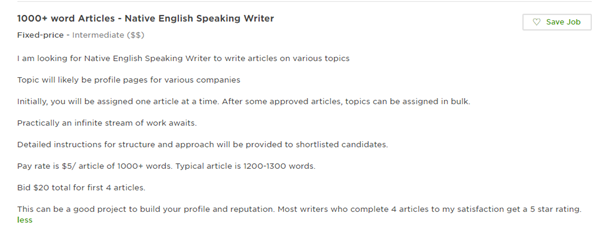 This is listed as an intermediate level job (with two dollar signs!) – and yet it’s offering a paltry $5 for 1200 – 1300 words.
For a bit of context, I got $20 for a 500-ish word post when I started out freelancing at the beginning of 2008. These days, I’d be asking around $70 for a 2,000 word post (depending how much research it required).
Even a very fast writer working on a familiar topic is going to take at least an hour to produce a 1,200 – 1,300 word post. $5/hour or less? That’s pathetic!
Oh, and Upwork also take a “service fee” of 20% of what you earn for your first $500 … making this gig worth just $4 per long blog post.
Ouch.
Here’s another – this one listed as “Entry Level”. Again, the pay on offer is ridiculously low. They’re also expecting some degree of technical knowledge (understanding keyword optimisation and using OneDrive to send files):
This is listed as an intermediate level job (with two dollar signs!) – and yet it’s offering a paltry $5 for 1200 – 1300 words.
For a bit of context, I got $20 for a 500-ish word post when I started out freelancing at the beginning of 2008. These days, I’d be asking around $70 for a 2,000 word post (depending how much research it required).
Even a very fast writer working on a familiar topic is going to take at least an hour to produce a 1,200 – 1,300 word post. $5/hour or less? That’s pathetic!
Oh, and Upwork also take a “service fee” of 20% of what you earn for your first $500 … making this gig worth just $4 per long blog post.
Ouch.
Here’s another – this one listed as “Entry Level”. Again, the pay on offer is ridiculously low. They’re also expecting some degree of technical knowledge (understanding keyword optimisation and using OneDrive to send files):
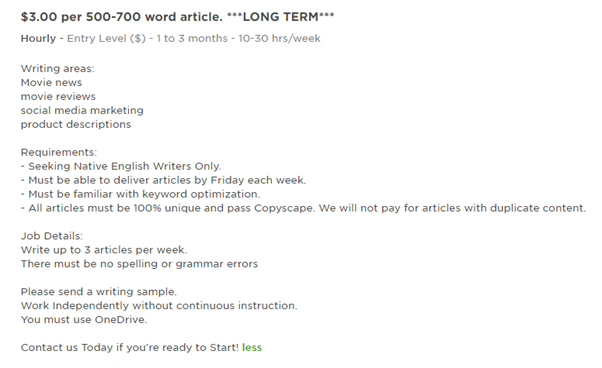 There must be better stuff out there in the mills, right?
Well … not much better.
Even “Expert” opportunities on content mills pay poorly. Here’s one offering $25 (AUD) per article – and expecting a quick turn-around. Having a title, topic and talking points for each article won’t necessarily speed up the writing process, especially as these topics are ones where some research is likely to be required.
There must be better stuff out there in the mills, right?
Well … not much better.
Even “Expert” opportunities on content mills pay poorly. Here’s one offering $25 (AUD) per article – and expecting a quick turn-around. Having a title, topic and talking points for each article won’t necessarily speed up the writing process, especially as these topics are ones where some research is likely to be required.
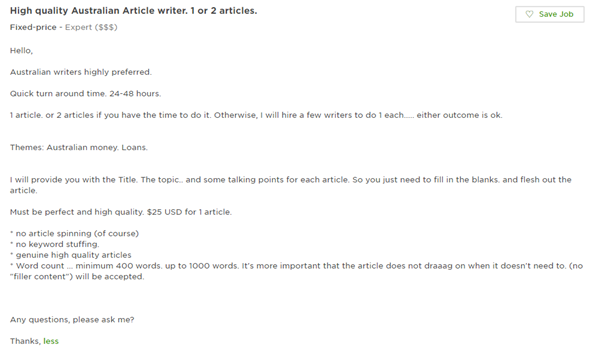 I chose these particular job ads not because they were unusually terrible – but because they were some of the few that stated a rate of pay.
Others presumably paid so little they didn’t even want to mention it, in case it put people off applying! (And, of course, once you’ve applied for a job and finally heard back, you might be tempted to take it even if the pay on offer is much less than you were expecting.)
In case it’s not becoming clear already, content mills are bad news for freelancers.
I chose these particular job ads not because they were unusually terrible – but because they were some of the few that stated a rate of pay.
Others presumably paid so little they didn’t even want to mention it, in case it put people off applying! (And, of course, once you’ve applied for a job and finally heard back, you might be tempted to take it even if the pay on offer is much less than you were expecting.)
In case it’s not becoming clear already, content mills are bad news for freelancers.
Why You Should Avoid Working for Content Mills
If you’re still tempted to join a content mill because you think it’ll be an easy option … here’s why I’d steer well clear. Content mills are inevitably a race to the bottom. More and more desperate writers chasing lots of gigs that ask for “your best rate” means that everyone is getting paid next to nothing. The work you get will likely be unenjoyable. You’ll probably end up writing on topics that you aren’t particularly interested in or don’t know much about. You may well get articles sent back with lots of picky requests for edits … cutting your hourly rate even further. There are much better options out there! Believe it or not, freelancers writers can (and do!) get paid professional rates. When I write posts for The Write Life, I get $75 per post (usually around 1,000 words, which takes me about an hour to write and edit). That’s fifteen times what the first example job from Upwork was offering. Your work with a content mill is not “good experience”. Some new writers think that at least a content mill will allow them to get a foothold in the freelancing writing world. But many opportunities through content mills won’t give you a byline (your name on your work). Plus, you’re highly unlikely to be writing for a website that’ll impress your clients.Good Alternatives to Writing for Content Mills
Of course, the majority of freelance writing jobs are never advertised on content mills. In fact, they’re often not advertised at all. They’re instead filled privately: a company is looking to hire a writer / editor and they ask around for recommendations, search their contacts on LinkedIn, think of a writer they saw on one of the blogs they read. If you’re at an early stage of your freelancing career and building your client base, try:- Looking for publications that pay writers: pitch them an idea (or several ideas). Most mainstream magazines pay, and you can find a very handy list of websites that pay writers on Make a Living Writing.
- Asking family and friends to spread the word that you’re now freelancing. I know this can feel a little awkward, but word of mouth is hugely powerful … and many people will want to hire someone they already know (even if only through a friend).
- Getting in touch with past colleagues to let them know you’re freelancing. Again, this can feel awkward … but you never know who might be looking for a writer/editor. A couple of my first freelancing gigs were with former colleagues: one wanted a new website written and set up for a holiday home she owned, and another wanted a document proofread.
- Asking small local charities or non-profits if they need a writer (you could try offering your services through any local groups on Facebook). You might not get paid, but this can be a great way to get some portfolio pieces and/or a testimonial … and you’ll be helping a good cause.
- Guest posting for large blogs. Some may be open to hiring writers (most of my own freelancing jobs developed out of guest posting relationships). Even if they aren’t likely to hire you, you’ll still have pieces for your portfolio, plus normally a “bio” where you can advertise your writing services at the end of your blog post.
- Joining a private community that collates quality writing jobs. Freelance Writers Den, for instance, has a “junk-free job board”: they charge a monthly membership fee, but you may well feel it’s worth it in order to get quality job leads (plus lots of freelancing tuition and peer support).
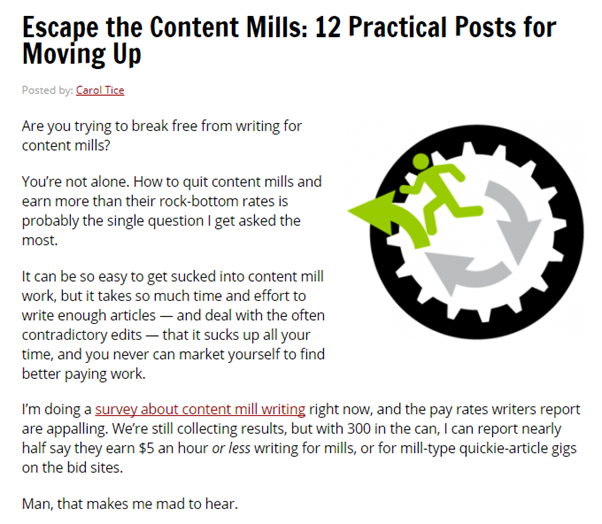 If you have been writing for content mills, please don’t feel that I’m criticising you – far from it! I admire your tenacity.
But I also want you to know that there are better writing jobs out there for you. Take all the positives you can from your experience (maybe you learnt some techy skills or dramatically improved your writing speed…) and then move onwards and upwards.
If you’ve got questions, or stories to share about your own experience with content mills – whether good or bad – then pop a comment below.
If you have been writing for content mills, please don’t feel that I’m criticising you – far from it! I admire your tenacity.
But I also want you to know that there are better writing jobs out there for you. Take all the positives you can from your experience (maybe you learnt some techy skills or dramatically improved your writing speed…) and then move onwards and upwards.
If you’ve got questions, or stories to share about your own experience with content mills – whether good or bad – then pop a comment below.
About

I’m Ali Luke, and I live in Leeds in the UK with my husband and two children.
Aliventures is where I help you master the art, craft and business of writing.
Start Here
If you're new, welcome! These posts are good ones to start with:
Can You Call Yourself a “Writer” if You’re Not Currently Writing?
The Three Stages of Editing (and Nine Handy Do-it-Yourself Tips)
My Novels

My contemporary fantasy trilogy is available from Amazon. The books follow on from one another, so read Lycopolis first.
You can buy them all from Amazon, or read them FREE in Kindle Unlimited.


Thanks Ali, the word ‘mill’ screams a bit of a warning! Images of something out of Dickens – sounds similar 🙂
Doesn’t it just?! 😀
Hi, Ali!
I’ve never been a fan of freelance platforms. The reason is that: suppose a freelancer works his butt off to build a great profile and some day he wakes up and receives an email that the platform he was relying on is now shutting down.
What happens next?
Chaos.
Right?
A long time ago, I figured out on my own that relying on the freelance platforms isn’t going to work for me. Since then I programmed myself that way. I have been fortunate to work with amazing clients … okay, the majority of them have been great.
But, seriously though, I’m glad that I made that decision.
Hassaan Khan’s last blog post ..How to Choose the Best Blogging Niche
Most depressing is when you submit work and are told it didn’t meet the client’s standards. How many have used that excuse to get work for nothing I wonder?
That’s awful. I certainly get the impression that at least some clients are pretty unscrupulous, and I know I’ve seen comments on Make a Living Writing saying they’d been told the same thing.